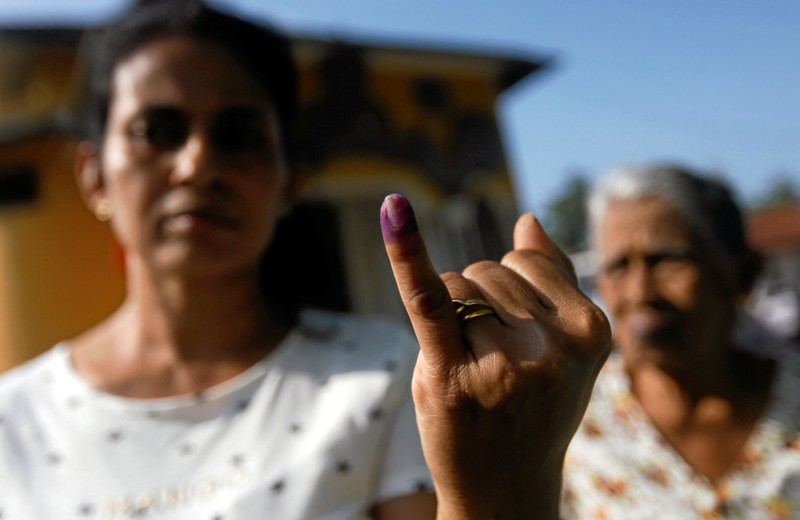
A woman shows her ink-stained finger after casting her vote at a polling station during the long-delayed local government elections in Colombo, Sri Lanka February 10, 2018. REUTERS/Dinuka Liyanawatte
February 11, 2018
By Shihar Aneez and Ranga Sirilal
COLOMBO (Reuters) – A political party backed by Sri Lanka’s former president Mahinda Rajapaksa looks set for a landslide victory in local polls, results showed on Sunday, potentially undermining the island nation’s unity government and its reform agenda.
The unexpectedly strong showing could lead to defections away from the centre-left party led by President Maithripala Sirisena, a partner in the country’s coalition government, analysts said, creating instability in the legislature.
The local polls were the first elections since the unity government of Sirisena’s centre-left Sri Lanka Freedom Party (SLFP) and Prime Minister Ranil Wickremesinghe’s centre-right United National Party (UNP) took office in August 2015.
Rajapaksa’s Sri Lanka Podujana Peramuna (SLPP), a party formed by breakaway members of Sirisena’s party, had won control of 223 local councils out of a total 328 that had declared results as of 1545 GMT. The UNP took control of 42 councils and SLFP 10.
Results for a further 42 local councils have not yet been announced.
The local elections were long delayed. The councils were dissolved more than two years ago after their tenure ended.
“Rajapaksa’s electoral performance comes as a surprise and will be problematic for President Sirisena,” Shailesh Kumar, director with political risk consultants Eurasia Group, told Reuters.
Dinesh Gunawardena, an SLPP legislator, told reporters in Colombo the Sirisena “government has lost the people’s mandate and should resign now”.
CORRUPTION CHARGES
Family members of Rajapaksa, now a legislator on the opposition benches, are facing corruption charges ranging from misappropriation of state properties to unexplainable assets
Two of Rajapaksa’s sons, Namal and Yoshitha, have been arrested and released on bail over money laundering allegations.
His brother, Basil, who headed the economic development ministry, has also been arrested at least three times – twice over suspicion of misuse of anti-poverty funds and once over suspicion of laundering money and released on bail.
All three men deny any wrongdoing.
“The Rajapaksas will try to use this victory and destabilise the government to cover up their corruption charges,” Cabinet Spokesman Rajitha Senaratne told Reuters. “But we will stand united and maintain political stability in parliament.”
Rajapaksa, 72, commands the backing of 54 members of parliament who have defected from Sirisena’s party. The president’s party has 41 legislators and the prime minister’s party commands 106 MPs in the 225-member parliament.
“The parliament is likely to see defections, and Rajapaksa will call the shots,” Kusal Perera, a local political columnist, told Reuters.
Lakshman Yapa Abeyawardene, a junior minister in Sirisena’s party, said the president had discussed the situation with members of his SLFP and had said the results represented a vote against the prime minister’s reform agenda.
“The president wanted to tell the media that he is going to make a big change,” he told Reuters, without elaborating.
Rajapaksa campaigned against the government’s failure to curb the cost of living and to take action against corruption, as well as against higher taxes, the privatisation of state assets, and reduced welfare for the poor and retired soldiers.
The government has promised a new constitution that devolves power, the facilitation of an international probe into alleged war crimes during the final phase of a 26-year civil war, IMF-backed fiscal discipline and post-war reconciliation.
However, it has yet to deliver on these reforms or on promised anti-corruption measures.
The two coalition parties’ unexpected defeat follows a bitter fight between them, with each blaming the other for the failures in the run-up to the local polls.
The president and his supporters have opposed or neutralised many of the UNP reforms. Under the constitution, Sirisena cannot dissolve the parliament until early 2020, while the parliament needs a two-thirds majority to impeach the president.
Sirisena has said he wants to take charge of the economy, which is currently handled by the UNP.
Danushka Samarasinghe, research head at Softlogic Stockbrokers said the results could bring more uncertainty to the market and ongoing economic reforms could be overshadowed by parliamentary politics.
(Reporting by Shihar Aneez and Ranga Sirilal; editing by Richard Pullin and Gareth Jones)

